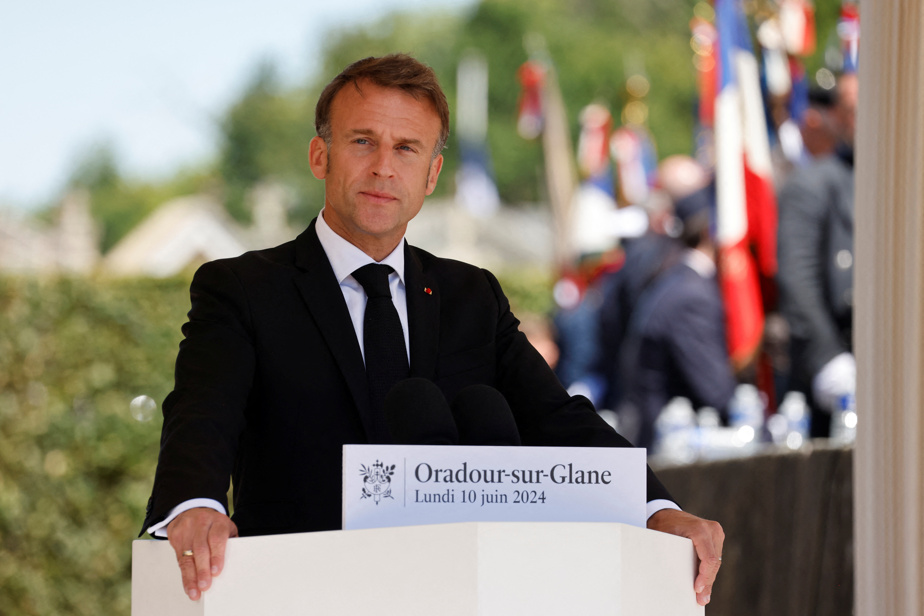(Paris) The call in France by the leader of the main right-wing party to forge an unprecedented alliance with the far right created a new twist on Tuesday, two days after the shock dissolution of the Assembly and the calling of legislative elections by the president Emmanuel Macron who ruled out any resignation.
“Disloyalty”, “lies”, “personal” game… A deluge of criticism fell on the president of the Republicans (LR) after his call to ally for the elections of June 30 and July 7 to the National Rally (RN ), who triumphed on Sunday at the Europeans.
“We need an alliance, while remaining ourselves, with the RN and with its candidates,” declared Eric Ciotti on the TF1 channel, immediately disavowed by several executives of his party who denounced a historic turnaround.
Taking a hard line on immigration, Mr. Ciotti broke down a barrier which had until then kept his party, the declared heir of General de Gaulle, away from any agreement with the RN, whose ancestor was co-founded by a former Waffen-SS.
The Minister of the Interior Gérald Darmanin, ex-LR rallied to Emmanuel Macron, accused Mr. Ciotti of having “signed the Munich agreements”, initialed in 1938 in particular by France and Nazi Germany.
Another LR rallied to the president, former Prime Minister Edouard Philippe, took the opportunity to “reach out” to the LRs opposed to the alliance with the RN.
The charge was also severe within LR itself, which local elected officials and nearly a dozen senators left. “I will never endorse, under any pretext, an agreement with the RN contrary to the interests of France and our history,” launched the President of the Senate, Gérard Larcher.
Galvanized by its success in the European elections, the RN welcomed “the courageous choice” of Mr. Ciotti. “Forty years of a pseudo sanitary cordon, which caused many elections to be lost, is disappearing,” Marine Le Pen, patron of RN deputies, told AFP.
For several years, the party has sought to demonize itself, and it is trying to broaden its base before the elections, which could bring it to power for the first time.
On the other hand, on Tuesday he gave up on forming an alliance with the other far-right party, Reconquête!, founded by the polemicist Eric Zemmour, several times convicted of inciting racial hatred.
While the right is torn apart, President Macron postponed the press conference planned for Tuesday until Wednesday to clarify his “orientation”.
Edouard Philippe scratched him, saying that he was “not sure that it is completely healthy for the President of the Republic to run a legislative campaign.”
The former prime minister of President Macron also said that the dissolution had caused “astonishment” and “sometimes anger” among “many” French people, due to the “considerable risk of seeing the RN come to power”.
In an interview with Figaro Magazine, Mr. Macron assured in any case that he would refuse to resign “whatever the result” of the legislative elections. “I’m going there to win! “, he assured despite his popularity at half mast.
To those who consider him “crazy” to cause such an earthquake as the country prepares to host the Olympic Games (July 26–August 11), Mr. Macron defended a “good decision”. “I say to the French, don’t be afraid, go vote. »
According to a Harris Interactive-Toluna poll published Monday, the RN is credited with 34% of voting intentions in the first round, and a relative majority in the second, from 235 to 265 deputies. The Macronists could only count on 125 to 155 seats, the left 115 to 145 and LR 40 to 55.
After being divided during the European campaign, the four main left-wing parties – La France insoumise (LFI), PS, Ecologistes, Communist Party – announced on Monday evening that they would present “single candidates from the first round” within the “Popular Front”.
An alliance criticized on Tuesday by Prime Minister Gabriel Attal, deeming the alliance with LFI (radical left) “revolting”, accused of ambiguities on anti-Semitism. Jewish institutions denounced a “disgrace” and an “infamous agreement”.
Negotiations resumed on Tuesday to refine a common program and attempt to resolve the debate over the candidate for the post of prime minister, with some refusing that this role should fall to LFI leader Jean-Luc Mélenchon, a divisive figure and former presidential candidate.
The latter congratulated himself on X that LFI “throws grudges into the river and builds popular unity. France is not condemned to Bardella’s punishment. The New Popular Front knows how to govern.”




